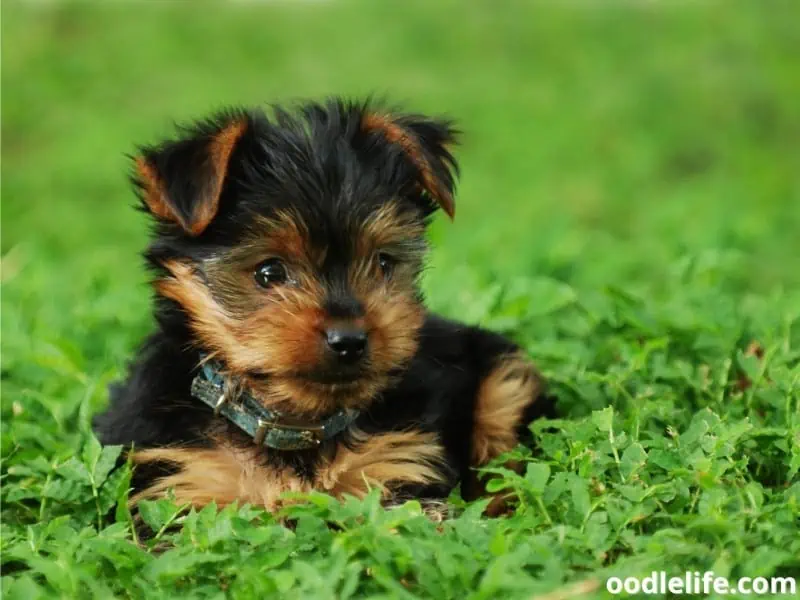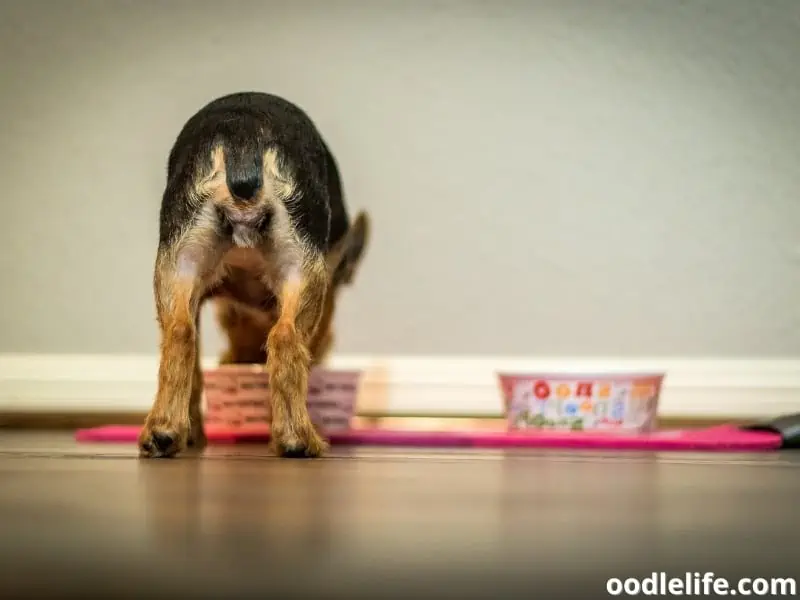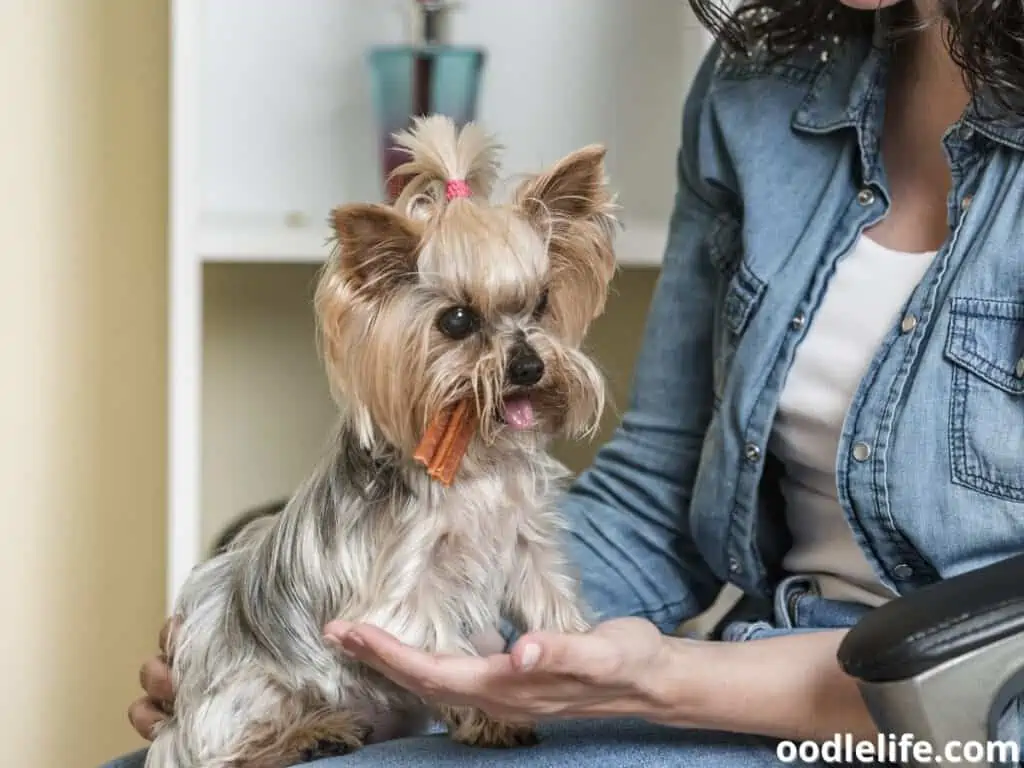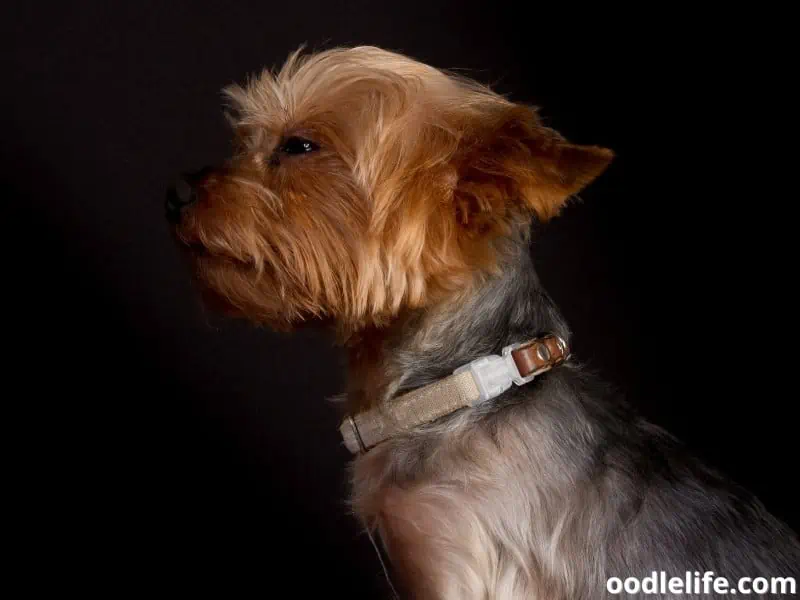Why Is My Yorkie So BIG? (Fat Yorkie Guide)
It happens so fast: one day, you bring home a brand new, tiny Yorkshire Terrier puppy. Then, seemingly overnight, he turns into a fully-grown, adult dog and you find yourself wondering where your baby went.
But when your dog keeps growing past its expected size, you might be asking a different question: why is my Yorkie so big?

The Yorkshire Terrier is considered a small dog breed, so anyone who adopts one is correct to expect their dog to be a particular size. As a dog from the Toy Group, there are certain expectations in place.
Two factors can interrupt these expectations and cause your little Yorkie to be a tad bigger than you thought he’d be. The first has to do with the breeding practices it came from. The second factor directly relates to your dog’s lifestyle.
If you’re wondering why your Yorkie is so big, get into the details.
What Is the Standard Size of a Yorkshire Terrier?
First, it’s important to explore how big you should expect a standard Yorkshire Terrier to be. You may think your dog looks big, only to find out he’s perfectly within breed standards.

Yorkies are official members of the Toy Group, meaning they are very small in stature. It also means that they display some of the common Toy Group characteristics, which include:
- Affectionate
- Low energy
- Good with adults and older children
- Timid of other dogs
- Okay with being alone
These companion dogs are all small, but each breed has its size standards according to the AKC. The Yorkie should weigh seven pounds or less, and at its mature age, it will be between 8 and 9 inches tall.
So, if your Yorkie exceeds those ranges, it may be considered a big Yorkie. But how did this happen?
Breeding Practices
It’s tough to get breeding down to a perfect science. Many factors are out of a breeder’s control, including which genes a puppy picks up and which they leave behind. It can also be challenging to know the exact lineage from which a dog came.

Some Yorkies wind up bigger because there was another dog mixed into its lineage at some point down the line. A dog can pick up a gene from several generations back that other pups in the same litter don’t get. This one gene can increase their size.
Yorkies that weigh over seven pounds may be considered Giant Yorkies. Some of the larger of this breed can reach as much as 15 pounds without being unhealthy. The cause is usually due to its bloodline.
But because kennel clubs only look back three generations, you can still register a Giant Yorkie as a purebred.
Teacup Yorkies
Some breeders purposefully try to impact a dog’s size – particularly in the Toy Group. Intentionally tiny Yorkies are called Teacup Yorkies or Mini Yorkies. They weigh four pounds at most and have the distinct honor of fitting inside a purse.

Due to the many health issues that tend to come with Teacup Yorkies, some people question the breeding practice. These dogs often get sick, have fragile bone structures, can’t tolerate extreme temperatures, and have a shorter lifespan.
Unhealthy Lifestyle
The other (more common) answer to “why is my Yorkie so big?” is that it’s overweight. An unhealthy lifestyle can cause your dog to gain more weight than it should, which can lead to a myriad of problems.
But many factors can play a role in your dog being overweight. Let’s take a look.
Too Much Food
The simplest cause for weight gain in a dog is that you’re feeding it too much daily. Dogs will often eat whatever you give them; they’re not likely to stop eating because they’ve had enough. They will finish what’s in front of them.

That’s why you should know how many calories your dog should have.
Calorie needs will vary from breed to breed. Things like the size of your dog and how active it is will determine how much food is sufficient. Because Yorkies are small dogs, they don’t need to eat a lot to be healthy and satisfied.
Also, keep in mind that puppies usually need more calories than adults. Puppies need extra fuel to sustain their growth. They also have more energy and therefore burn more calories regularly.
A Yorkie puppy needs about 55 calories per pound of body weight. This amount decreases to around 40 calories per pound for adults weighing between 4 and 8 pounds.
If you have questions about your dog’s diet, you can always ask your veterinarian.
Too Many Treats
If you have spoken to your vet and it seems like your Yorkie’s diet is spot on with all the recommendations, it’s time to evaluate the extra food in your dog’s life. That’s right: treats.

It doesn’t matter if your dog is getting a healthy diet if you’re over-feeding him treats. Treats contain calories just as their food does, so giving them too many treats throughout the day could be contributing to weight gain.
Treats include any food you share from your meals and snacks throughout the day. A little piece of carrot or steak here and there likely won’t hurt, but making it a habit might.
Not Enough Activity
Yorkshire Terriers are small dogs that don’t require lots of exercise like other breeds, but they still need a little activity to stay mentally stimulated and physically in shape. Moderate activity is usually enough for this breed.

If your Yorkie spends its day eating meals and lounging on the couch, it’s not getting enough activity. This breed should get at least one walk per day – but two is better. You can also toss in a 10 to 20-minute fetch game or other backyard activity.
Yorkies function best with short bursts of activity rather than long stretches, so stay away from hikes and keep toys around the house. These activities should be enough to burn those extra calories and keep weight at bay.
Hypothyroidism
Hypothyroidism is a condition found in humans but can also impact dogs. This condition happens when the thyroid gland isn’t making enough hormones. The hormone imbalance that results in can cause issues with the metabolism, which affects weight.

A dog with hypothyroidism can show many symptoms, including:
- Hair loss or thinning
- Skin infections
- Thick skin
- Reduced activity
- Low tolerance for cold
But one of the most noticeable signs of hypothyroidism is weight gain. If your dog leads a healthy lifestyle, including a good diet and regular exercise, but is still gaining weight, ask your vet about hypothyroidism.
Your vet can conduct various tests for this condition. Treatment might include hormone replacement therapy, though there is no cure currently.
Old Age
Old age in dogs can cause physical issues that make them gain weight. For example, older dogs often have conditions like joint pain, diabetes, and chronic inflammation – all of which can lead to weight gain.

For some older Yorkies, it may become more difficult to move. A decrease in activity like this can result in fewer calories burned. The less your dog moves, the more calories are stored in the body.
Final Thoughts
Most Yorkies will weigh no more than seven pounds. But if your Yorkie weighs more than that, there’s a good chance it’s overweight. Talk to your vet about your options to ensure your dog is living the healthiest lifestyle possible.
Hopefully, you’re now fully informed and have an answer to “why is my Yorkie so big?”